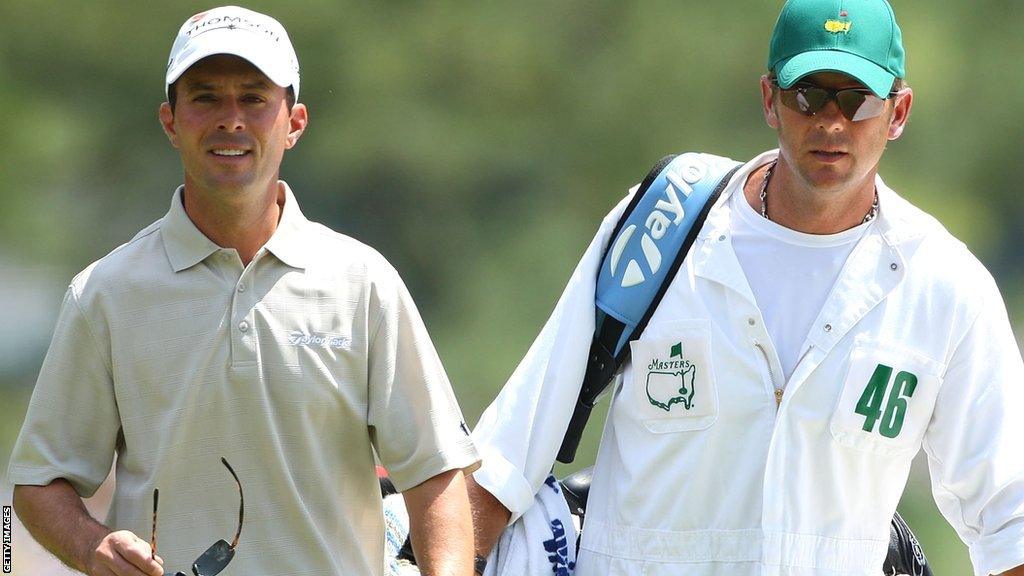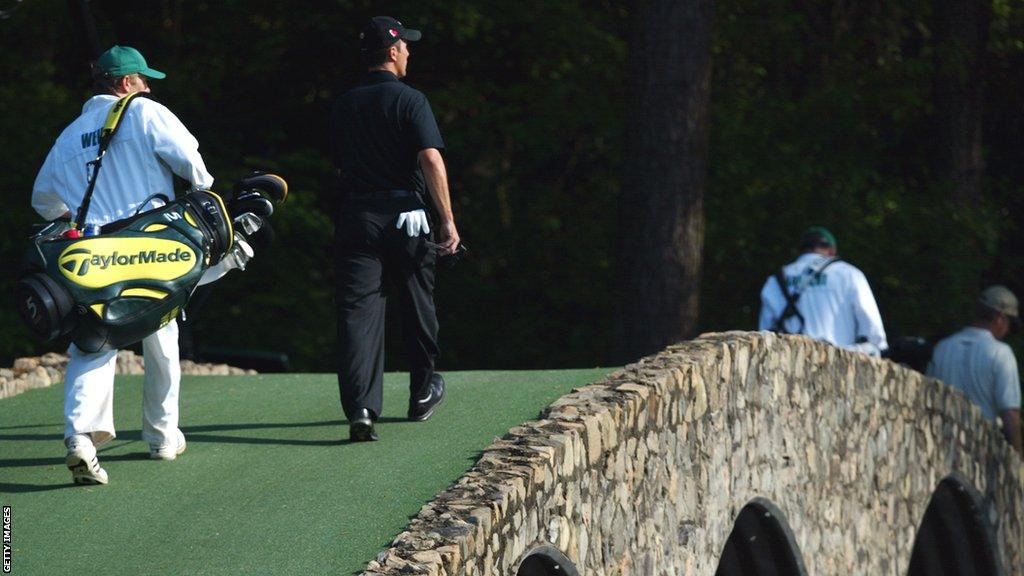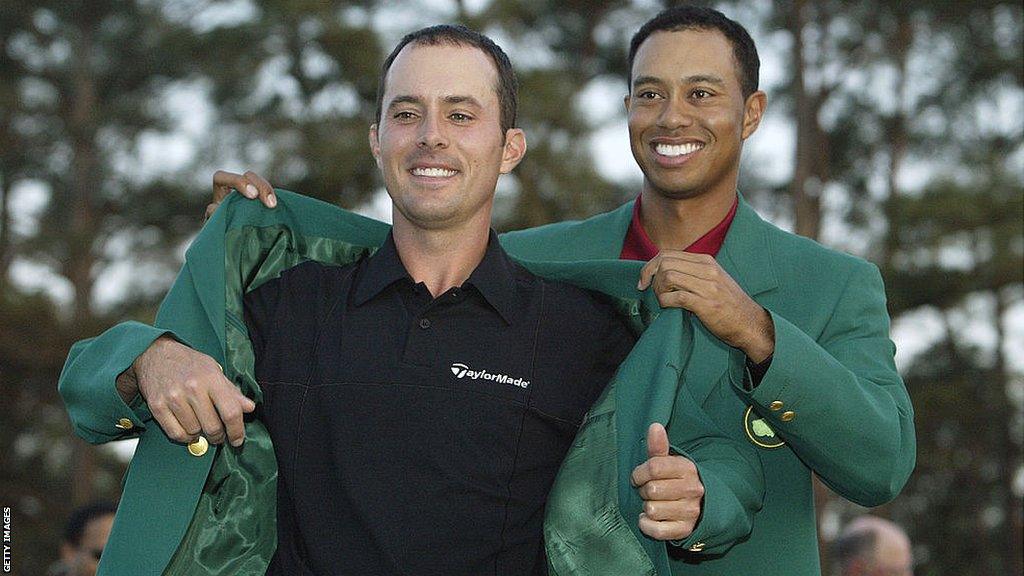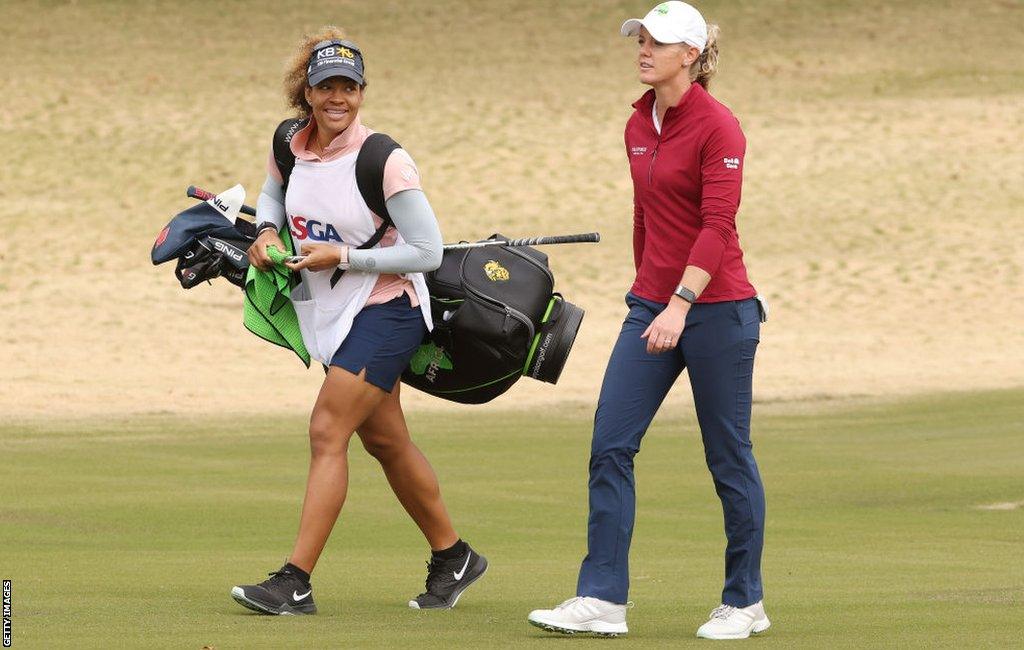Masters 2024: 'A sporting role like no other' - the role of a golf caddie
- Published


Mike Weir (left) and Brennan Little - friends since teenage years - conquered Augusta together in 2003
Sign up for notifications to the latest Insight features via the BBC Sport app and read the latest in the series here.
The sun was low in the sky and the shadows lengthening from the towering Augusta pine trees as Canadian Mike Weir approached his ball on the 10th fairway.
Len Mattiace, his opponent in a sudden-death play-off, was in a spot of bother off the green.
To all but secure the coveted Masters green jacket, Weir just had to hit the green with his approach shot.
A life-changing victory rested on a couple of degrees of direction and a few pounds of pressure on the club face. The slightest waver in concentration, though, and it could be all over. The chance to land a first major may never come around again.
The tension was huge. But some of the talk that had got him there was decidedly small.
Caddie Brennan Little had lightened the mood around the Augusta National by chatting to Weir about the stars of WWE wrestling.
Being a caddie is a lot more than carrying clubs - you are a confidant, coach, walking database, psychiatrist, the furthest inside the ropes and in the midst of the action. It is a sporting role like no other.
Little grew up in southern Canada near Toronto with the dream of becoming a major champion himself.
As a young prospect, he played with and against Weir before realising that he may need to go down a different route to his best friend to taste success at the highest level.
"I played some professional golf, but my career ended in 1998. I just wasn't playing very well and I wasn't getting any better," Little tells BBC Sport.
"Mike had gotten his tour card and I started as his caddie in 1999 thinking I would do it for a little bit. I have been caddying ever since.
"It is just kind of one of them things that happened. I just fell into it."
Like with all best friends, shared laughter is the sound of memories being made.
For Little and Weir, it is no different.
Both shared a love for family and sport, with Little often poking fun at Weir for his lack of knowledge on WWE.
"If you get on well and have things in common, whether it is sports or whatever, that is the key," Little says.
"If you don't have anything in common then you are going to be out there walking around trying to create conversation.
"Mike and I used to talk a lot about wrestling on the course. He was always a closet wrestling fan."

Weir shot 75 in the third round of the 2003 Masters to lose his four-shot lead, before recovering to take the title
Weir went into his final round at Augusta two shots off the lead, but a superb 68 took him into a duel with American Mattiace for golf's biggest prize and a $1m winner's cheque.
It was two mates having fun around the course that got Weir and Little into such uncharted territory. It was the same formula that saw them home to Butler Cabin.
From that 10th fairway, Weir struck his approach shot and it landed on the back of the green - leaving a putt to win the Masters.
"They have been best friends since they were teens, playing junior golf and the Canadian tour together. He has worked with Mike since he came through the qualifying school. It is quite a partnership," said the television commentator as Weir lined up his putt.
It certainly felt like a team effort to Little.
"It is a huge moment of personal satisfaction for everyone," Little says of a successful weekend on the bag.

Tiger Woods, who won the 2002 Masters, presents Weir with his Green Jacket
Little, who earned a weekly salary from the then 32-year-old Weir, also gained a share of all his winnings. It is a common arrangement, with percentages varying between pairings.
A caddie might get a basic of $2,000 (£1,580) a week, with 7% of their player's winnings, jumping up to 10% for a finish near the top of the leaderboard. If a season goes well, a caddie might pick up a bonus.
However, most caddies cover their own expenses, which, on a globe-trotting tour, can quickly rack up.
When times are good and the million-dollar cheques get split, both parties are happy. But when times get tough and the money thins out, a golfer may feel that a hole in his pocket is the only thing their caddie is providing.
All in all, even best friends can get fired.
"It is all part of the business," Little says. "You are probably going to get fired and you are also going to leave a player and get a better job.
"Sometimes change is good; guys can just get flat. They might fire their caddie and say, 'We are still good buddies but I have to make a change to mix something up'."
Weir and Little worked together for 11 years until 2010 before Little took up a new challenge with Colombian Camilo Villegas.
There were no hard feelings between Weir and Little, rather a mutual agreement to try something new.
Little now works with American Gary Woodland, with the pair winning the 2019 US Open together.
In golf, the caddie and player can both benefit from working with others. In 2023, Little spent time with England's Justin Rose in the run-up to the Open.
"It was interesting to see how he operates," says Little. "It is totally different. It is good to see his routines - when you are with one guy you only see the same thing.
"I would even encourage it - if Gary had a buddy to play with him, I would be totally fine with it.
"It helps clear his head space. If you have a guy who relies on you too much as a caddie, he is not thinking for himself."
The one constant on the tour as a caddie is the community. Bits of local know-how about the course and its set-up are often shared.
At last year's Masters, Brooks Koepka's caddie from Northern Ireland, Ricky Elliott, was cleared of revealing to Little, in contravention to golf's rules,, external what club Koepka had used for a shot.
While caddies are not allowed to swap tips mid-round, they often walk the course together before competitions to discuss strategy.
"Sometimes it is good to just talk to guys and see what they think about a hole and whether or not I agree - it doesn't matter," says Little.
"It is good to get some different opinions."
Taneka Mackey is part of that caddie community. She carries Amy Olson's bag on the Ladies Professional Golf Association Tour (LPGA). Like Little, she fell into the role.
Growing up in the Bahamas and making their national golf team, Mackey always had a passion for travelling. After a chance pairing to help Olson at an event in the Bahamas in 2017, she saw the possibility of a career that would take her round the world.
"Amy said, 'I still want you to caddie for me - can you come to Australia?' When I heard the word 'Australia' I knew I needed to get in shape and learn a few more things," Mackey says.

Mackey (left) won a golf scholarship to Chicago State University having played the first six years of her career with a set of borrowed clubs
Mackey has found herself at events and venues across the world where she is the only black woman on the bag.
On one trip to Asia there were no black female players and only one black caddie. Mackey felt uncomfortable for "half a second" with thoughts of "do I belong here?" entering her head.
"I am here for a reason and I am going to be the person that makes the difference," she says.
"From then I have never looked back. I take everything in my stride, staying as positive as possible. There is so much negativity in this world that the last person I am going to beat down is myself.
"With female caddies, there aren't many - it is hard physically, some women might want kids, and you can't carry a bag and caddie forever."
In golf, consistency, longevity and commitment are core components of success.
Mackey's turn of speed has also proved useful.
A keen basketball player in her youth and the daughter of a talented hurdler, Mackey had to sprint back down the second fairway at one event after realising she had dropped her towel on the opening green. With each club requiring a dry-down after every shot, there was not a moment's hesitation.
Olson tied for second at the 2020 US Open and Mackey is still hunting a first major title on the bag.
The 29-year-old also has a different achievement in her sights. Her goal is to set up an elementary school in the Bahamas and inspire the next generation of young black girls.
"Golf-wise, I want to win, but if I never win as a caddie I am perfectly fine with that. It is just more showing kids and inspiring people, especially in the Bahamas, that you can do what you put your mind to," she says.
"I speak at schools here in the Bahamas in my off weeks just to show kids that you can grow up in a small country but do big things."
From the feeling of winning a major to inspiring a new generation - the ambitions of a caddie are as varied as the duties.
It is much more than just carrying a set of clubs.